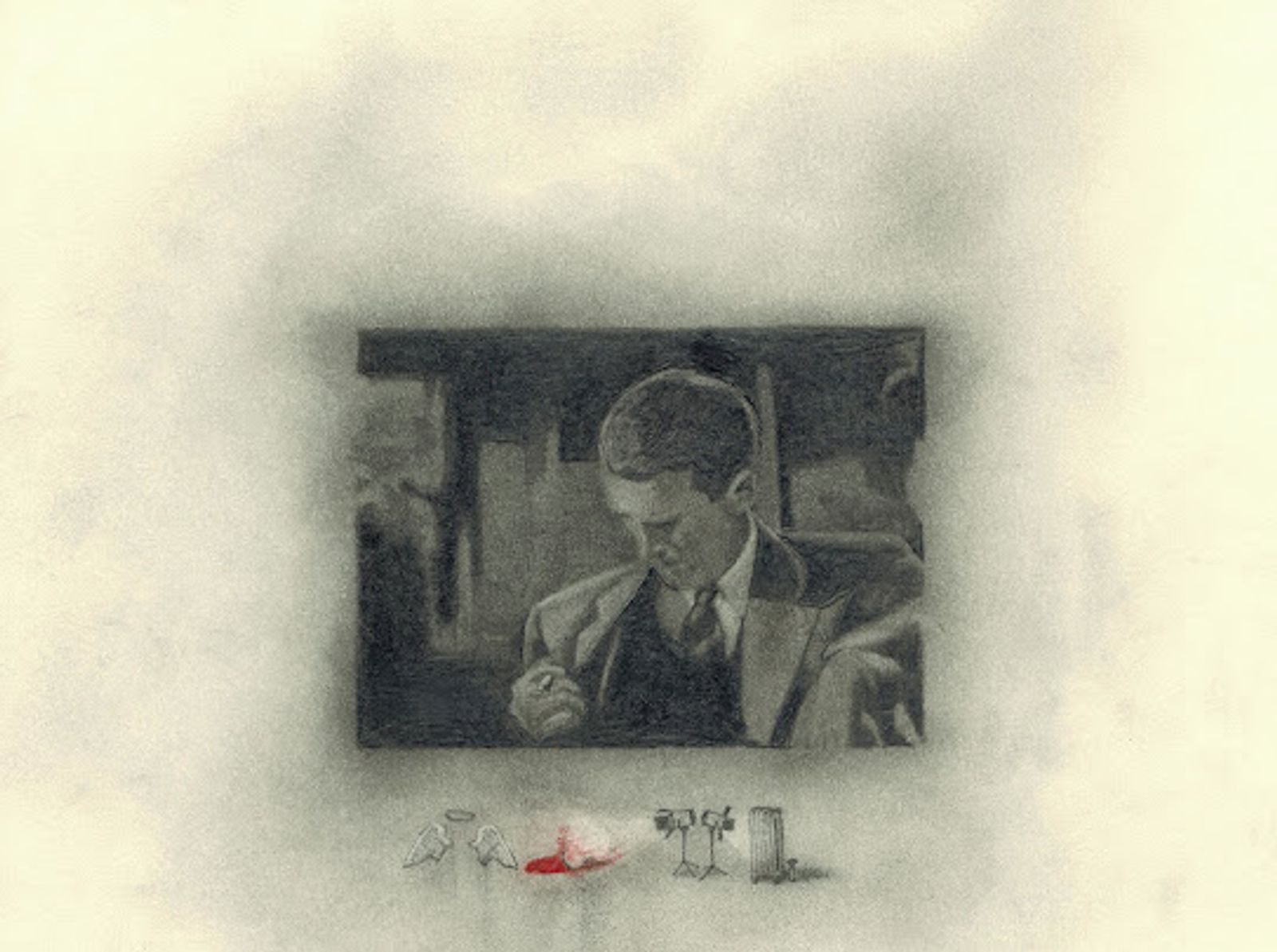
Four Poems

Written After Reading Jerome Sala’s “How Much?”
In a group photo
taken at a Ramones
concert at the Savoy
in San Francisco in
1976, I wear a tacky
sweater and hold
a book, the title of
which I can’t make
out. I always had
a book with me in
those days. But who
brings a book to a
punk rock concert?
And where is it now,
this book that I hold so
close to my heart?
Things to Do in a ’70s Disaster Film
Get shaken by an earthquake (in Sensurround).
Flee a swarm of killer bees.
Escape an overturned ocean liner.
Be buried by an avalanche.
Count the minutes before a meteor strikes.
Ignite a bomb in the lavatory of a Boeing 707.
Board the Hindenburg.
Survive a hurricane.
Ride a rollercoaster (in Sensurround).
Wait to be rescued from a burning skyscraper.
Carole Lombard
At the end of one of her movies (No More Orchids, 1932), her father (played by
Walter Connolly) flies his airplane into the side of a mountain. We see a brief explosion, shattered fuselage. An image difficult to take, knowing it will be her fate ten years later. A death unbefitting (as if we have a say in the matter) this shimmering blonde beacon of the silver screen. “Survived by all of us,” is how Frank O’Hara, himself a tragic figure, put it. (In Chicago today it’s raining.) Screwball heiress, phony princess, small town librarian, gold-digging chorus girl—all her roles sparkle with her inimitable quick-wittedness. She held her own with the leading men of the time: Gary Cooper, William Powell (husband number one), John Barrymore, Fredric March, Clark Gable (husband number two), James Stewart, Cary Grant. At age eighteen, a car accident nearly ended her career—glass from a smashed windshield left a scar on her cheek. (You can see it in close-ups.) A scar keep her from becoming a star? Not on your life, buster. When the United States entered World War II, Lombard traveled to Indiana, her home state, where, in a single evening, she raised over two million dollars in defense bonds. Instead of returning to Hollywood by train, as planned, Lombard decided to fly. (She had quarreled with Gable before the trip, and wanted to make haste.) On the evening of January 16, 1942, her plane crashed into the side of a mountain southwest of Las Vegas. All twenty-two souls on board, including Lombard and her mother, perished. Lombard had recently completed filming the Ernst Lubitsch anti-Nazi black comedy To Be or Not to Be. By the time it was released, one month after her death, fate had already answered the question.
November 15, 2022
Never Argue with the Movies
1
In To the Last Man, a 1933 Western
about feuding families, Randolph Scott
is trying to get on with Esther Ralston
(unschooled and pretty wild). She
“ain’t used to being polite at.” He notices
that she’s not wearing shoes. “It must
be sort of hard going barefoot through
these mountains.” She takes offense:
“It’s none of your business that I ain’t
got shoes and stockin’s.” “I didn’t mean
anything that way. They write poems
about barefoot girls like you.” “What’s
a poem?” she asks belligerently. “Oh,
a lot of words put together. They don’t
mean anything, but they sound pretty good.”
2
In The Lives of a Bengal Lancer, a 1935
adventure film, Gary Cooper and Franchot
Tone have both been tortured (bamboo
shoots under fingernails) and imprisoned
in a cell. Neither of them cracked under
pressure; they’re true heroes. Shortly before
the explosive finale, Tone quotes Lewis Carroll:
“‘The time has come,’ the Walrus said, /
‘To talk of many things: / Of shoes—and ships—
and sealing-wax— / Of cabbages—and kings—’”
“Oh, shut up!” barks Coop. “You don’t like
poetry?” “How should I know, I never read any.”
3
In Evelyn Prentice, a 1934 crime drama,
Myrna Loy receives a book in the mail
from a supposed admirer (actually a gigolo)
she met at a nightclub. “Bonjour,” says
her friend Una Merkel when she joins her
for breakfast. (Her French is a charming
affectation.) “Don’t tell me you go in for
early morning reading. What’s the book?”
“It’s called Sonnets to the Sun,” replies Loy.
“What to the which?” “Sonnets to the Sun.
Pretty, isn’t it? It’s a book of poems.” “Poems?
In the morning? Darling, it’s your liver.”
Loy reads her the letter that came with it.
“Oh, the good-looking thrill with broad
shoulders,” coos Merkel, when she realizes
who it’s from. “Go on.” “I’m taking the liberty
of sending you, along with this letter, a book of
my poems.” “A poet,” sighs Merkel, “It’s an
awful waste of broad shoulders.” “Ever hear
of him?” “Je n’ai pas.” “Neither have I. Coffee?”
David Trinidad
David Trinidad is the author of more than twenty books of poetry, collaborations, and edited volumes. These include Digging to Wonderland: Memory Pieces, Swinging on a Star, Notes on a Past Life, Dear Prudence: New and Selected Poems, and Plasticville, finalist for the Lenore Marshall Poetry Prize. Trinidad is editor of Punk Rock Is Cool for the End of the World: Poems and Notebooks of Ed Smith and A Fast Life: The Collected Poems of Tim Dlugos, which won a Lambda Literary Award. He is a professor of poetry at Columbia College, Chicago.
Patrick David
Patrick David (b. 1987) is a multi-disciplinary artist and filmmaker. His short Line Dogs premiered in 2022 and he is currently working on his first feature-length film, Little Falls. More of his work can be found at https://www.instagram.com/patrick_____david
